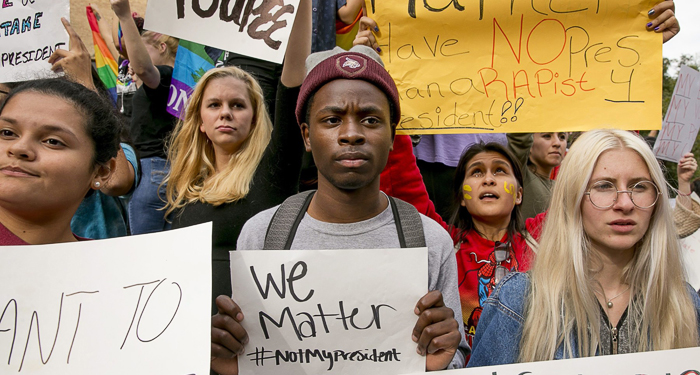Democracy’s crisis of imagination
Voters are hungry for new ideas. Is a ‘halfwitted demagogue’ the best they can do?
By Claire Boychuk and Mark Dance
16 November 2016, iPolitics Insights
A day after Donald Trump’s election to the world’s highest elected office, American far-right polemicist Ann Coulter adjusted her long blond hair, stared into a CBC camera and articulated her support for a ban on Muslim immigration. Peter Mansbridge asked a few polite questions, smiled and thanked her for her time.
The encounter did not bode well for Canadians. That night on The National, the chief correspondent for Canada’s public broadcaster failed to push back against a foreign perspective shot through with hatred.
In the wake of Trump’s election, the main lesson for Canadians is that change is coming. We can shape that change and choose pluralism over the forces of white nationalism, but to do so will require listening to a diversity of voices and a willingness to participate in robust public conversations about racism, land, multiculturalism and equality.
And that work must start now. Keep reading…
Africa has some work to do before it starts its own humanitarian agency
By Romola Adeola, Steinberg Postdoctoral Fellow in International Migration Law, Centre for Human Rights and Legal Pluralism
10 October 2016, The Conversation
 The African Union (AU) has recognised that there needs to be an urgent response to the humanitarian crisis caused by millions of people being displaced on the continent. Africa has a huge challenge. Almost 30% of the world’s 41 million internally displaced people and close to 20% of the world’s refugees are in Africa. The root cause of displacement across the continent is conflict. The impact is felt internally as well as beyond Africa’s borders.
The African Union (AU) has recognised that there needs to be an urgent response to the humanitarian crisis caused by millions of people being displaced on the continent. Africa has a huge challenge. Almost 30% of the world’s 41 million internally displaced people and close to 20% of the world’s refugees are in Africa. The root cause of displacement across the continent is conflict. The impact is felt internally as well as beyond Africa’s borders.
And more people are bound to be displaced given the threat of climate change and a growing wave of natural disasters.
Several proposals were canvassed at the first meeting of the specialised technical committee set up to consider the issues of migration, refugees and internally displaced persons. The most significant was the establishment of an African Humanitarian Agency.
The idea isn’t new: it was mooted in 2015 by the East African Regional Consultation on Humanitarian Effectiveness meeting in Arusha, Tanzania. And the AU presented the idea to the 2016 World Humanitarian Summit in Istanbul, Turkey. But can it work? Keep reading…
Enforcing the deadname
By Florence Paré
17 October 2016, The McGill Daily
 For three weeks during the summer, I had to read my deadname — my assigned name at birth, a name I no longer use — in the McGill Outlook title bar every day, multiple times a day. The name on my email and on myCourses had reverted to my deadname. It tends to do that, and it can take some time to be fixed.
For three weeks during the summer, I had to read my deadname — my assigned name at birth, a name I no longer use — in the McGill Outlook title bar every day, multiple times a day. The name on my email and on myCourses had reverted to my deadname. It tends to do that, and it can take some time to be fixed.
When this happens, trans students are left to decide between avoiding sending emails from our institutional email accounts and risking looking unprofessional, or out ourselves to every single person we message. Emails sent to us by others will inevitably show the wrong name. I opted for the latter option – outing myself – because I had important work emails to send, so now at least a few dozen new people know my deadname. It’s not very easy to forget, unfortunately, and all my interactions with those persons in the future will be made more uncomfortable by their knowledge – hopefully, they won’t discriminate against me for being a trans woman if the opportunity arises. Keep reading…
Pro bono work and the adversarial justice system
By Jan Dobrosielski
11 October 2016, Bulletin de l’ABC Québec
 As a second year law student at McGill University, the role of the CBA as one of civil society’s most important contributors to the discussions about pro bono services was brought to my attention by my Legal Ethics class curriculum. My own reading of the CBA’s ongoing efforts in this regard further sharpened my understanding of the issues involved (see, for example, the CBA’s Proposed National Benchmarks for Public Legal Assistance Services and the work of its Pro Bono Committee). Thus, while I’m far from being an expert on this topic, my head is already swirling with the thorny debate surrounding the roles, duties, and obligations of legal professionals.
As a second year law student at McGill University, the role of the CBA as one of civil society’s most important contributors to the discussions about pro bono services was brought to my attention by my Legal Ethics class curriculum. My own reading of the CBA’s ongoing efforts in this regard further sharpened my understanding of the issues involved (see, for example, the CBA’s Proposed National Benchmarks for Public Legal Assistance Services and the work of its Pro Bono Committee). Thus, while I’m far from being an expert on this topic, my head is already swirling with the thorny debate surrounding the roles, duties, and obligations of legal professionals.
The CBA is one of a series of organizations and instruments that promote the very noble and necessary understanding that jurists are both well-placed to prevent, and uniquely responsible for, the misuse of our legal system. Hand in hand with this view is the idea that jurists ought to act in the best interests of society, and this is where the role of pro bono legal services comes in – particularly as a tool to address the crisis of access to justice in Canadian society. There is little that I can disagree with in these arguments. Indeed, they would seem to represent the hope that most people have for the legal profession and the esteem in which they would like to hold lawyers in. Keep reading…
L’espionnage en temps de paix en droit international public
 Par Iñaki Navarette
Par Iñaki Navarette
20 septembre 2016, Annuaire canadien de droit international, Cambridge University Press
Iñaki Navarrete (BCL/LLB’16), who is currently clerking at the Inter-American Court of Human Rights, was recently published in the 2016 annual edition of The Canadian Yearbook of International Law. His article, written in 2015 under the supervision of Professor René Provost, is titled “L’espionnage en temps de paix en droit international public”.
His article examines the legality of peacetime espionage under international law. To that end, the article abandons the debate of whether espionage is per se legal or illegal, and instead subdivides the practice of espionage into constituent state acts. In particular, following the ICJ’s Timor-Leste v Australia decision, Mr. Navarrete contents that States have a right to the protection of their communications with legal advisers, when they are engaged in the peaceful settlement of a dispute with others States through arbitration or negotiations. Keep reading…

